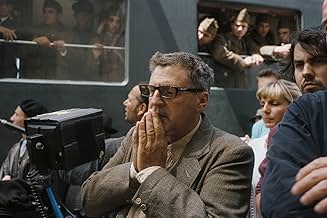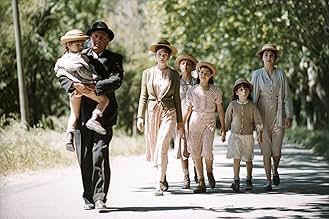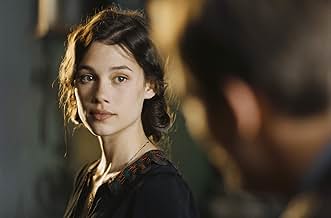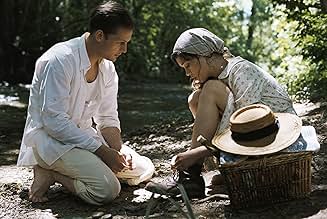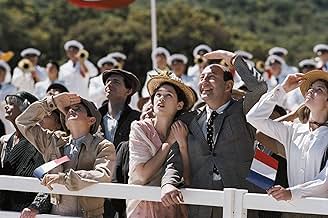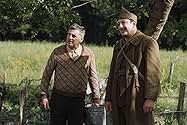La fille du puisatier
- 2011
- Tous publics
- 1h 47m
IMDb RATING
7.0/10
4.3K
YOUR RATING
In 1930s southern France, a father is torn between his sense of honor and his deep love for his daughter when she gets in trouble with the wealthy son of a shopkeeper.In 1930s southern France, a father is torn between his sense of honor and his deep love for his daughter when she gets in trouble with the wealthy son of a shopkeeper.In 1930s southern France, a father is torn between his sense of honor and his deep love for his daughter when she gets in trouble with the wealthy son of a shopkeeper.
- Director
- Writers
- Stars
- Awards
- 2 wins total
- Director
- Writers
- All cast & crew
- Production, box office & more at IMDbPro
Featured reviews
The Well-Digger's Daughter is a french movie, remake of another famous french film of the 40's.
If you don't know anything about french cinema, know that this remake features well known comedians such as Daniel Auteuil (it's also his first work as a director), Kad Merad, Nicolas Duvauchelle, Jean-Pierre Darroussin, Sabine Azema, and Marie-Anne Chazel.
The original film was directed, written and produced by Marcel Pagnol, famous not only for his films but also for plays and novels that have become classics.
The remake definitely honors the classic, and I can't find one single thing to criticize. The actors all deliver moving and natural compositions, from the loving and torn father (Auteuil) to the moody Mrs Mazel (Azema), from the benevolent Felipe (Merad) to the seductive Jacques (Duvauchelle). By the way, it certainly isn't hard to see why the heroine falls for him after just one encounter ;) The main character, Patricia, is played with tact and sweetness by Astrid Bergès-Frisbey, who somehow reminds me of Jane March. She was unknown before this role (even if it's not her first), but no doubt this is the year of her breakthrough, as she will soon be seen interpreting a mermaid in the next Pirates of the Caribbean.
The direction is precise, careful, and manages to capture each small emotion of the characters. It really serves well the beautiful and moving plot. You're completely immersed into the story and can have your eyes wet more than once, even though the movie isn't a melodrama nor a tragedy. This story is timeless, and universal. I would recommend it to absolutely everyone. It's a 5-star film!
If you don't know anything about french cinema, know that this remake features well known comedians such as Daniel Auteuil (it's also his first work as a director), Kad Merad, Nicolas Duvauchelle, Jean-Pierre Darroussin, Sabine Azema, and Marie-Anne Chazel.
The original film was directed, written and produced by Marcel Pagnol, famous not only for his films but also for plays and novels that have become classics.
The remake definitely honors the classic, and I can't find one single thing to criticize. The actors all deliver moving and natural compositions, from the loving and torn father (Auteuil) to the moody Mrs Mazel (Azema), from the benevolent Felipe (Merad) to the seductive Jacques (Duvauchelle). By the way, it certainly isn't hard to see why the heroine falls for him after just one encounter ;) The main character, Patricia, is played with tact and sweetness by Astrid Bergès-Frisbey, who somehow reminds me of Jane March. She was unknown before this role (even if it's not her first), but no doubt this is the year of her breakthrough, as she will soon be seen interpreting a mermaid in the next Pirates of the Caribbean.
The direction is precise, careful, and manages to capture each small emotion of the characters. It really serves well the beautiful and moving plot. You're completely immersed into the story and can have your eyes wet more than once, even though the movie isn't a melodrama nor a tragedy. This story is timeless, and universal. I would recommend it to absolutely everyone. It's a 5-star film!
The Well Digger's Daughter (2011)
A drama set in the early 20th Century that ends up being about traditions and love and how two different kinds of families come to understand each other. While not a Romeo and Juliet story at all, it has that basic problem when two young people from different social realms fall in love.
What keeps this from becoming commonplace is the beauty of it all, including what I would call beautiful acting--heartfelt, nuanced, interesting. In a way it is the well digger, the dad played by Daniel Autueil who is the main character. He's a familiar face (if not name) to those who have seen a few French films, and he's wonderful. Though a practical man (he digs wells the old fashioned way for a living), he has a sense of dignity and honor that impresses even the rich family whose charming son has seduced the title character.
We feel no violation here, just the normal confused crossed-star love issues. War intrudes, and then the dreaded report from the front, and the families still have to cope together. For reasons you'll see.
Marcel Pagnol, the great mid-Century French writer whose story is the basis for this, was also a filmmaker, and you can feel a kind of homage or influence at play here, which adds yet another layer of appreciation.
It's also a really funny movie, one of the dramas that is so witty and warm you laugh along with the characters like you would your friends (assuming you have funny friends). I loved the whole experience. If it ends with a feeling like, okay, all is resolved one way or another, I guess that's fine. There is no epiphany here, but rather a sweet slice of life from a provincial time we'd love to never forget.
A drama set in the early 20th Century that ends up being about traditions and love and how two different kinds of families come to understand each other. While not a Romeo and Juliet story at all, it has that basic problem when two young people from different social realms fall in love.
What keeps this from becoming commonplace is the beauty of it all, including what I would call beautiful acting--heartfelt, nuanced, interesting. In a way it is the well digger, the dad played by Daniel Autueil who is the main character. He's a familiar face (if not name) to those who have seen a few French films, and he's wonderful. Though a practical man (he digs wells the old fashioned way for a living), he has a sense of dignity and honor that impresses even the rich family whose charming son has seduced the title character.
We feel no violation here, just the normal confused crossed-star love issues. War intrudes, and then the dreaded report from the front, and the families still have to cope together. For reasons you'll see.
Marcel Pagnol, the great mid-Century French writer whose story is the basis for this, was also a filmmaker, and you can feel a kind of homage or influence at play here, which adds yet another layer of appreciation.
It's also a really funny movie, one of the dramas that is so witty and warm you laugh along with the characters like you would your friends (assuming you have funny friends). I loved the whole experience. If it ends with a feeling like, okay, all is resolved one way or another, I guess that's fine. There is no epiphany here, but rather a sweet slice of life from a provincial time we'd love to never forget.
Daniel Auteuil is one of my favorite actors... in the world.
I rented this film earlier tonight from Video Futur, a French movie rental chain, after missing it at the cinéma. My girlfriend and I just finished watching it. Wow.
It's fantastic !!! Of course, you should start with the Marcel Pagnol classics like Jean de Florette and Manon des Sources. Read the books, watch the films, fall in love with the south of France. If you're already familiar with the works of Pagnol, you can jump right in and enjoy. Heck, even if you're not familiar with them, watch this film anyway.
In my opinion, Provence is the most beautiful place in France, and possibly the world. Pagnol used real locations in Provence, including Aubagne, Salon, and other locales as the settings for his best dramas.
This is no exception. La fille du puisatier (English: The welldigger's daughter) is a well-crafted story that I believe Americans, and cinema fans all over the world, will enjoy. The film is an excellent and faithful adaptation of Pagnol's original story, and the actors' performances elevate this film to the highest level.
Auteuil, along with co-stars Kad Merad and Jean-Pierre Darroussin knock this thing out of the park. I remember Merad and Darroussin from other films, including L'immortel (English: 22 bullets), but this takes the cake.
This is not to take away from the amazing performances of the daughter in the title, Astrid Bergès-Frisbey as Patricia Amoretti, as well as the solid performance of Emilie Cazenave as her sister Amanda.
All in all, great acting, great writing (based on an already-good story) and beautiful cinematography, made for a completely enjoyable viewing experience, at least for us.
I hope this comes out soon in the US so that American audiences can see for themselves.
I remember seeing Jean de Florette and Manon des Sources (English: Manon of the spring) in my high school French class. My teacher was nice enough to share some French movies with us. Decades later, I'm lucky enough to be living in France, putting all those French lessons to good use, enjoying Pagnol again, and dreaming, everyday, about moving back to the south.....to Provence.
I rented this film earlier tonight from Video Futur, a French movie rental chain, after missing it at the cinéma. My girlfriend and I just finished watching it. Wow.
It's fantastic !!! Of course, you should start with the Marcel Pagnol classics like Jean de Florette and Manon des Sources. Read the books, watch the films, fall in love with the south of France. If you're already familiar with the works of Pagnol, you can jump right in and enjoy. Heck, even if you're not familiar with them, watch this film anyway.
In my opinion, Provence is the most beautiful place in France, and possibly the world. Pagnol used real locations in Provence, including Aubagne, Salon, and other locales as the settings for his best dramas.
This is no exception. La fille du puisatier (English: The welldigger's daughter) is a well-crafted story that I believe Americans, and cinema fans all over the world, will enjoy. The film is an excellent and faithful adaptation of Pagnol's original story, and the actors' performances elevate this film to the highest level.
Auteuil, along with co-stars Kad Merad and Jean-Pierre Darroussin knock this thing out of the park. I remember Merad and Darroussin from other films, including L'immortel (English: 22 bullets), but this takes the cake.
This is not to take away from the amazing performances of the daughter in the title, Astrid Bergès-Frisbey as Patricia Amoretti, as well as the solid performance of Emilie Cazenave as her sister Amanda.
All in all, great acting, great writing (based on an already-good story) and beautiful cinematography, made for a completely enjoyable viewing experience, at least for us.
I hope this comes out soon in the US so that American audiences can see for themselves.
I remember seeing Jean de Florette and Manon des Sources (English: Manon of the spring) in my high school French class. My teacher was nice enough to share some French movies with us. Decades later, I'm lucky enough to be living in France, putting all those French lessons to good use, enjoying Pagnol again, and dreaming, everyday, about moving back to the south.....to Provence.
It should be pointed out that Marcel Pagnol's movie was filmed during the first combats which lead to the 1940 defeat and Pétain's Armistice .It was the first film released in the free zone which was shown in the occupied one in 1941; its success was huge. Just to say that in 2011 ,it has not the same meaning for the audience.
It was not the first time a Pagnol 's movie had been remade in his own country ;Claude Berri remade "Manon des sources " which he divided into two parts , considerably reducing the central role of the schoolteacher ;Auteuil was featured in Berri's film ,so it was only natural that he tackled "la fille du puisatier".
That said ,taking on Raimu's and Fernandel's parts was a challenge ; Auteuil's movie doesn't make them forget , it was insurmountable to surpass these monstres sacrés.
His movie is faithfull to its model ,it's shorter ,which is not a bad thing, for the 1940 work dragged on sometimes ;it was also impossible to transfer it to our era ,for the melodramatic side is obsolete today .
Auteuil adopts a welcome provençal accent ,so does Kad Merad :both actors are as efficient in comedy as in drama ;the same can be said about the excellent Darroussin(taking on Charpin's role) and Sabine Azema but they do not have any accent (because it sounds too prole ?)Azema has a tendency to overact .Auteuil's son portrays his grandson !
The cinematography is impeccable ,taking advantage of the provençal landscapes,where Patricia wanders (the first one ,Josette Day ("la belle et la bête",was IMHO more gracious and had a better way to wear the hat ); it's a good work ,useful to introduce Pagnol to the new generations (colors help),but I hope they 'll try and see the black and white one.
It was not the first time a Pagnol 's movie had been remade in his own country ;Claude Berri remade "Manon des sources " which he divided into two parts , considerably reducing the central role of the schoolteacher ;Auteuil was featured in Berri's film ,so it was only natural that he tackled "la fille du puisatier".
That said ,taking on Raimu's and Fernandel's parts was a challenge ; Auteuil's movie doesn't make them forget , it was insurmountable to surpass these monstres sacrés.
His movie is faithfull to its model ,it's shorter ,which is not a bad thing, for the 1940 work dragged on sometimes ;it was also impossible to transfer it to our era ,for the melodramatic side is obsolete today .
Auteuil adopts a welcome provençal accent ,so does Kad Merad :both actors are as efficient in comedy as in drama ;the same can be said about the excellent Darroussin(taking on Charpin's role) and Sabine Azema but they do not have any accent (because it sounds too prole ?)Azema has a tendency to overact .Auteuil's son portrays his grandson !
The cinematography is impeccable ,taking advantage of the provençal landscapes,where Patricia wanders (the first one ,Josette Day ("la belle et la bête",was IMHO more gracious and had a better way to wear the hat ); it's a good work ,useful to introduce Pagnol to the new generations (colors help),but I hope they 'll try and see the black and white one.
Remaking a Pagnol film is asking for trouble. Film snobs will dismiss the remake without giving it a chance, though 60 years ago those same film snobs probably dismissed Pagnol as a film director, finding him hopelessly inferior to Renoir or ... Afficionados of Raimu, an unquestionably great actor - when he had a good role - will say that no one can do what he did. And they would be right; no one can out-Raimu Raimu. A force of nature, because Raimu at his best was a force of nature, cannot be imitated or equaled. But a role can be done a different way, even if the words are the same, just as different great actors can succeed at Hamlet or King Lear. And yes, I speak of Shakespeare. Theater/literature snobs can guffaw, but who cares? Let them go about their business.
And I will go about mine, which is to talk about this movie, which is remarkably moving. Moving in part because Pagnol's script was a masterpiece, yes, but also because this is a very well-done realization of it.
The first thing that struck me about this movie was the color, when you see the scenery. Pagnol, for whatever reason, really didn't do a lot with scenery in his black and white movies. This movie shows what that deprived us of. It is done in the best tradition of the color versions of Jean de Florette, Manon des sources, La gloire de mon père, and Le château de ma mère. The countryside around Salon de Provence comes alive, and is beautiful.
I was also struck by the use of music, which again is not a high point in Pagnol's version. The Italian song, so wonderfully recorded by Caruso, is used in very moving ways here. Auteuil has a better sense of how to use music in a film than Pagnol did, at least with this script.
But the heart of this movie is Pagnol's text, and this cast, a great one, does it beautifully. True, at times, as I marveled at the genius of Pagnol's text, I wondered if that meant these actors were acting it, rather than becoming the characters. That may be true in some cases, though not for Kad Merad, who becomes Philippet every bit as much as Fernandel did. I can hear Raimu reciting the lines Daniel Auteuil speaks, and beautifully, perhaps because they are so different, certainly because Raimu delivered them in a way that engraved them in my memory. But Auteuil makes them very moving as well. He is not a force of nature as Raimu was, but his Pascal is also a real character.
What I realized, over and over again watching this movie, is that the script was indeed written by a playwright, and Auteuil respects that. We still have fully-developed scenes, as movies used to have when they were still imitating theater. And, as a result, with this great script and these great actors, we have deeply moving moments, such as when Pascal says goodbye to his daughter, sending her off to raise her bastard child elsewhere. Or, even more deeply moving, when the parents of the father of her child, having just lost their son in the war, come to see the child, the last remnant of their now lost son. Every line of that scene is deeply moving: Pascal's pride in his grandson, the parents' grief and longing for their son. (I didn't care for the mother's final admission that she burned her son's letter rather than deliver it to Patricia; that was better done in the previous version.)
A film script is like a play: it can be done in more than one way, if it's worth doing - as this script most certainly is. It will not wipe away memories of Pagnol's 1940s version, nor should it. You don't have to forget Olivier's Hamlet to love Jacobi's, or Branaugh's, or ... I suspect the very film snobs who dismiss Pagnol's own work will cause this film not to enjoy the success it deserves, but that would be a real crime. This is, in fact, a wonderful realization of Pagnol's very beautiful, very wonderful script.
---------------------------------
I watched this movie again this evening, and really have nothing to add to what I wrote before, other than to say that it is a beautiful realization of Pagnol's script. Auteuil, Merad, and Darroussin are three of modern French film's finest actors, and they all give first-rate performances here. The often wonderful dialogue is delivered as in a great movie or play, lovingly and beautifully. Watch this. It's a deeply moving and wonderful movie.
And I will go about mine, which is to talk about this movie, which is remarkably moving. Moving in part because Pagnol's script was a masterpiece, yes, but also because this is a very well-done realization of it.
The first thing that struck me about this movie was the color, when you see the scenery. Pagnol, for whatever reason, really didn't do a lot with scenery in his black and white movies. This movie shows what that deprived us of. It is done in the best tradition of the color versions of Jean de Florette, Manon des sources, La gloire de mon père, and Le château de ma mère. The countryside around Salon de Provence comes alive, and is beautiful.
I was also struck by the use of music, which again is not a high point in Pagnol's version. The Italian song, so wonderfully recorded by Caruso, is used in very moving ways here. Auteuil has a better sense of how to use music in a film than Pagnol did, at least with this script.
But the heart of this movie is Pagnol's text, and this cast, a great one, does it beautifully. True, at times, as I marveled at the genius of Pagnol's text, I wondered if that meant these actors were acting it, rather than becoming the characters. That may be true in some cases, though not for Kad Merad, who becomes Philippet every bit as much as Fernandel did. I can hear Raimu reciting the lines Daniel Auteuil speaks, and beautifully, perhaps because they are so different, certainly because Raimu delivered them in a way that engraved them in my memory. But Auteuil makes them very moving as well. He is not a force of nature as Raimu was, but his Pascal is also a real character.
What I realized, over and over again watching this movie, is that the script was indeed written by a playwright, and Auteuil respects that. We still have fully-developed scenes, as movies used to have when they were still imitating theater. And, as a result, with this great script and these great actors, we have deeply moving moments, such as when Pascal says goodbye to his daughter, sending her off to raise her bastard child elsewhere. Or, even more deeply moving, when the parents of the father of her child, having just lost their son in the war, come to see the child, the last remnant of their now lost son. Every line of that scene is deeply moving: Pascal's pride in his grandson, the parents' grief and longing for their son. (I didn't care for the mother's final admission that she burned her son's letter rather than deliver it to Patricia; that was better done in the previous version.)
A film script is like a play: it can be done in more than one way, if it's worth doing - as this script most certainly is. It will not wipe away memories of Pagnol's 1940s version, nor should it. You don't have to forget Olivier's Hamlet to love Jacobi's, or Branaugh's, or ... I suspect the very film snobs who dismiss Pagnol's own work will cause this film not to enjoy the success it deserves, but that would be a real crime. This is, in fact, a wonderful realization of Pagnol's very beautiful, very wonderful script.
---------------------------------
I watched this movie again this evening, and really have nothing to add to what I wrote before, other than to say that it is a beautiful realization of Pagnol's script. Auteuil, Merad, and Darroussin are three of modern French film's finest actors, and they all give first-rate performances here. The often wonderful dialogue is delivered as in a great movie or play, lovingly and beautifully. Watch this. It's a deeply moving and wonderful movie.
Did you know
- TriviaJacques' motorcycle is a Triumph Speed Twin 5T.
- GoofsWhen Pascal visits her sister Nathalie to check on Patricia, Nathalie is heard humming Nina Rota's Romeo and Juliet theme, which wasn't written until 1968.
- ConnectionsRemake of La fille du puisatier (1940)
- SoundtracksCore 'n Grato
Written by Salvatore Cardillo and Alessandro Sisca
© BMG Ricordi Publishing
Avec l'autorisation d'Universal Music Vision
Sung by Enrico Caruso
(p) Recorded prior to 1972. All right reserved by BMG Music
Avec l'aimable autorisation de Sony Music Entertainment France
- How long is The Well-Digger's Daughter?Powered by Alexa
Details
- Release date
- Country of origin
- Official sites
- Language
- Also known as
- The Well-Digger's Daughter
- Filming locations
- Chapelle Saint-Sixte, Eygalières, Bouches-du-Rhône, France(some exteriors)
- Production companies
- See more company credits at IMDbPro
Box office
- Budget
- €12,500,041 (estimated)
- Gross US & Canada
- $386,368
- Opening weekend US & Canada
- $10,273
- Jul 22, 2012
- Gross worldwide
- $13,194,167
- Runtime1 hour 47 minutes
- Color
- Sound mix
- Aspect ratio
- 1.85 : 1
Contribute to this page
Suggest an edit or add missing content

Top Gap
By what name was La fille du puisatier (2011) officially released in Japan in Japanese?
Answer

